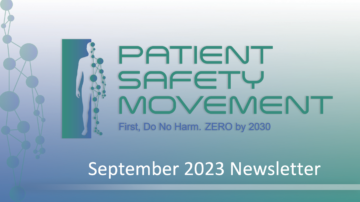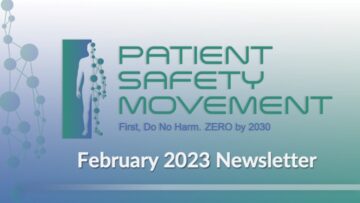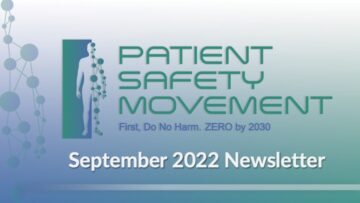“I want to be very, very clear: We are in a moment where we have tremendous momentum. This is the time.”
Joe Kiani, Founder
Patient Safety Movement Foundation
Letter from CEO

December is the time for giving, and I would like to thank those of you who have generously given to the Patient Safety Movement Foundation. We feel an immense sense of gratitude for you. Your donations, large and small, are vital to enabling us to bring family stories of preventable medical harm to the website
and to inform politicians who can pass legislation that makes healthcare safer through preventive measures. The President’s Council of Advisors on Science and Technology subgroup on healthcare has recommended to the US president virtually all our recommendations for a safer healthcare system for all. To those of you who would still like to donate, please visit our website at https://psmf.org/donate/.
Last Monday, December 11, the Global State of Patient Safety 2023 report was presented at the House of Lords in the UK. The report was developed by the Institute of Global Health Innovation at Imperial College London and Patient Safety Watch, and prepared under the guidance of the Chair of the Patient Safety Movement Foundation’s Governing Board, Dr. Mike Durkin. Dr. Neelam Dhingra, the unit head of the WHO Patient Safety Flagship, announced that this report gives a strong message to countries around the world on prioritizing patient safety measurement as a means to drive action for patient safety improvements. She looked forward to a meaningful collaboration with Mike Durkin and all involved in patient safety improvement as we continue on our common journey toward Zero Harm globally. She noted that the forthcoming Global Patient Safety Ministerial Summit will be in Santiago, Chile, on April 17-18, 2024.
So, your support is “moving the needle” in the right direction, and we thank you so much as we move closer to our goal of Zero Harm in healthcare by 2030. The words of one of the world’s first physicians in recorded history, Hippocrates, from over 2,500 years ago could materialize: “First, Do No Harm.”
“Measures Under Consideration List for 2024 CMS Quality Program” is now live. I encourage everyone to log on and give input. Proposed measure MUC 2023-188 Patient Safety Structural Measure is a vital one. We have responded, as have Patients for Patient Safety US, Healthcare Information and Management Systems, and many other groups. The measure includes many items to make healthcare safer. Log in at https://p4qm.org/events/pqm-prmr-2023-muc-list-hospital-measures-listening-session.
Finally, illicitly manufactured fentanyl is still being sold illegally to our young people or is added to other drugs sold on the street. The reversal drug Narcan is now being made readily available. However, now the villains are adding another illicit drug, Xylazine, a veterinary anesthetic that is not reversed by Narcan. Wireless monitoring is now available that will set off the cell phone alarm of the victim and alert them to breathe and use Narcan as well as bystanders to assist. It has been estimated that up to 100,000 adolescents in the US are dying every year from fentanyl, so please educate your children if they are at risk.
On that somber note, we look forward to a healthier and safer 2024.
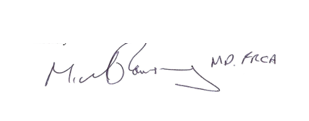
Michael A.E. Ramsay, MD, FRCA, Chief Executive Officer, PSMF
World AIDS Day – December 1
Approximately 1.2 million people in the US have HIV, and about 13% of them don’t know it and need testing. Certain populations continue to experience a disproportionate impact from HIV, with the highest rates of new diagnoses continuing to occur in the South. Worldwide, approximately 39 million people have HIV as of 2022, 53% of whom are women and girls, with an estimated 1.3 million new HIV infections in 2022.
The past 35 years have witnessed significant progress in addressing HIV and AIDS thanks to advances in medical research, increased access to treatment and prevention, and a broader understanding of the virus. Yet World AIDS Day on December 1 reminds us that we still have work to do to end the HIV-related stigma and to make sure HIV is no longer a public health threat.
Marking the 35th anniversary of World AIDS Day, this year’s theme is “World AIDS Day 35: Remember and Commit.” The first World AIDS Day in 1988 was created to provide a platform to raise awareness about HIV and AIDS and honor the lives affected by the epidemic. Today, World AIDS Day is an opportunity to rally policy makers and medical researchers to commit to this global struggle that still affects so many.
2023 Patient Safety Fellowship Program
The Global Interprofessional Patient Safety Fellowship for 2023 concluded earlier this month. Each fellow presented a capstone project on how they incorporated their yearlong coursework in efforts to tackle preventable medical errors in their home communities and workplace settings. We congratulate them on their impressive performance and wish them the best in their future endeavors in the field of patient safety.

Introducing the 2024
Global Interprofessional Patient Safety Fellows
The Patient Safety Movement Foundation’s Global Interprofessional Patient Safety Fellowship 2024 cohort has been announced. Our fellows are driven by a deep passion for patient safety, often sparked by firsthand encounters with patient harm events, and a desire to improve care outcomes in their home communities and workplaces. We welcome the 2024 class featured below and look forward to a successful year.
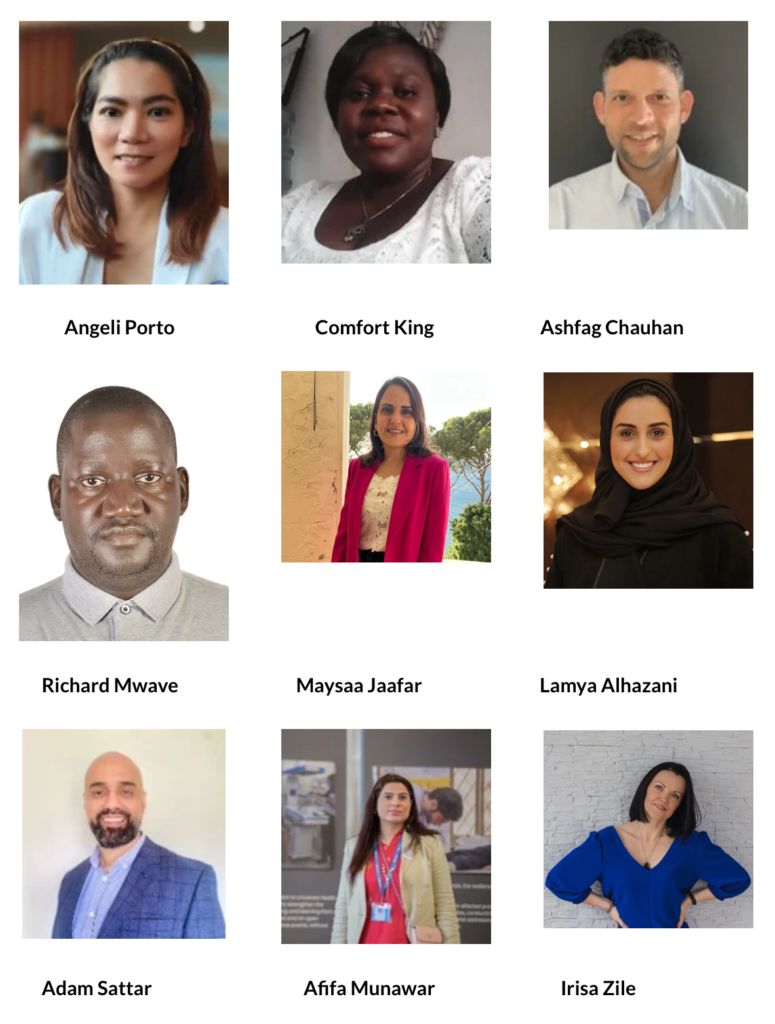
National Handwashing Awareness Week
December 3–9
According to the Centers for Disease Control and Prevention (CDC), handwashing is one of the most effective methods to prevent the spread of germs. Yet recent studies show that healthcare workers practice proper hand hygiene less than half of the time they should. Adhering to hand hygiene protocols is critical in healthcare settings and is one of the simplest and most cost-effective ways to prevent hospital-acquired infections.
Observed during the first full week of December, National Handwashing Awareness Week educates everyone, both inside and outside healthcare settings, on the proper technique for handwashing and the importance of maintaining hand hygiene. The CDC recently launched its “Life Is Better with Clean Hands” campaign to motivate adults to make clean hands part of their daily lives. The campaign helps raise awareness about the importance of handwashing at key times, such as before cooking or after using the bathroom. During cold and flu season, regular handwashing and sanitizing after spending time in public is even more important for everyone.
Parents and caretakers are also reminded that they can play an important role in teaching children to wash their hands. Handwashing becomes a lifelong healthy habit when children are taught at an early age by adults who lead by example.
Patient Safety Leadership Association
The Patient Safety Leadership Association is the brainchild of the Patient Safety Movement Foundation, conceived in response to the 2023 President’s Council of Advisors on Science and Technology’s recommendations to incorporate evidence-based practices throughout the healthcare ecosystem. This global network of healthcare thought leaders addresses the complex challenges associated with incorporating best patient safety practices into all aspects of healthcare operations. The Patient Safety Movement Foundation designed this forum to foster trust and participation by empowering members to discuss sensitive adverse events and seek advice from world-renowned patient safety leaders, clinicians, and researchers.
Chairman’s Column

We have seen the release of two reports in recent days that we hope will add to the debate on the importance of transparency as a key principle of patient safety as well as the practical application of this principle in terms of data sharing and data sharing agreements. We have shared the first report with you earlier, but for those who missed it, may I bring to your attention a report that we were commissioned to put together at Imperial College London to assess, through currently available patient safety indicator data, the global state of patient safety.
This report was launched this week at the House of Lords within the Houses of Parliament in London, hosted by Lord Ara Darzi and attended by the Chancellor for the Exchequer, the Right Hon Jeremy Hunt; the Secretary of State for Health and Social Care, Victoria Atkins; Dr. Neelam Dhingra, Head of the WHO Patient Safety Flagship; and Dr. Niek Klazinga, who has led indicator development and comparison for patient safety at OECD.
We know that timely, relevant, and comparable data is crucial to monitor progress in patient safety, but the report reveals significant challenges in how data is collected around the world. The researchers set out 89 indicators for patient safety, covering areas from waiting times to treatable mortality, combining them into a dashboard to show which data were available, or gaps, for each of the countries.
Of the 89 indicators included in the dashboard, no country had all indicators populated. Australia, New Zealand, and Norway have the highest amount of patient safety data available, with 75 populated indicators, while the UK has 68 populated indicators. The report also highlights the gaps in patient safety data in low- and middle-income countries (LMICs), with three out of every five indicators missing for LMICs. In addition, the research also highlights issues with the quality of data sources, with one in six indicators relying on data that is more than three years old, and only one in ten comes from data directly reported from patients.
The novel patient safety ranking looks at the 38 OECD countries across four key patient safety indicators: maternal mortality, treatable mortality, adverse effects of medical treatment, and neonatal disorders. Using this approach, Norway is at the top of the ranking, followed by Sweden and South Korea, while the UK ranks 21stout of 38 countries. There are significant opportunities for shared learning and improvement across comparable countries. In 2019, the UK could have saved 17,356 lives had it performed at the level of the top 10% of OECD countries. This would have meant 15,773 fewer deaths classified as treatable mortality, 776 fewer neonatal deaths, 27 fewer maternal deaths, and 780 fewer deaths due to adverse effects of medical treatment per year.
The report authors urge healthcare professionals, policymakers, and stakeholders to explore the full report and data dashboard for in-depth insights into global patient safety. They also call for immediate actions that will lead to enhanced patient safety worldwide. Three key recommendations were put forward to enhance safety measures, reduce performance differences, and improve the measurement of patient safety on a global scale.
- Assessment: A more balanced and comprehensive set of indicators is needed to address the data gaps identified through the report and to ensure comparable data is available for countries across all income levels.
- Adoption: A global repository of safety measurement and improvement interventions should be developed and made freely available to frontline teams of practitioners and researchers.
- Activation: The adoption of patient-driven safety measurement and improvement interventions must be accelerated to support patients, families, and carers to become active and equal partners in the delivery of safe care.
You can read the full report and explore the data dashboard at www.imperial.ac.uk/stories/global-state-of-patient-safety
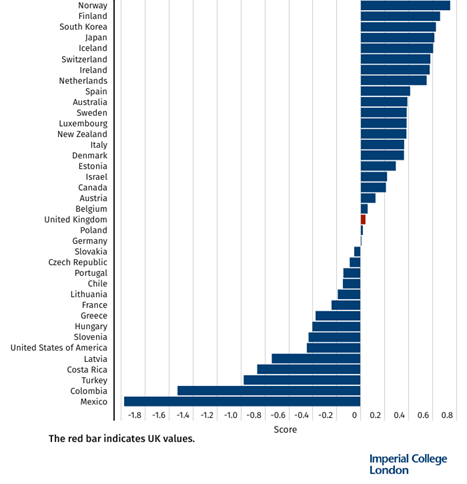
The second set of reports are the recent MBRRACE perinatal confidential inquiry reports comparing the care of Asian, Black, and White women whose babies died.
The aim of the MBRRACE-UK confidential inquiries is to review the quality of care as it was recorded in the medical notes and to find out whether different care may have made a difference for the baby and the mother.
- A comparison of the care of Asian and White women who have experienced a stillbirth or neonatal death
- A comparison of the care of Black and White women who have experienced a stillbirth or neonatal death
We know that significant differences in maternal and perinatal outcomes exist depending on ethnicity, and these reports add to the body of evidence that we are not investing sufficient resources for these populations and for those with multiple morbidities.
I would also like to bring your kind attention to a webinar on “Systems Thinking in Patient Safety” that we hosted at Imperial College London earlier this month as the Academic Lead for the WHO Global Patient Safety Collaborative. As soon as possible, we will share with you the link to the webinar, which will be on the Global Patient Safety Network website very soon. There were compelling insights on systems thinking from all our guest contributors, but undoubtedly the star of the show was our very own PSMF Governance Board Member, Professor Najm Meshkati, of the University of Southern California. Najm is a preeminent expert in this field across high-risk industries, recognized by his peers in the field as a Titan of Human Factors, and his presentation was a tour de force that I know you will enjoy.
As the battles continue to wage in both Ukraine and Gaza, we are constantly reminded of the need to support the safety of patients and healthcare workers in conflict states where it is always the most vulnerable who suffer the most.
We at the Patient Safety Movement Foundation are proud to be with those from other sectors who are supporting the transfer of medical and humanitarian aid to Gaza, and we will continue to do our best to ensure that supplies reach their intended recipients, despite the difficulties that are placed in the way.
This should also be a time for peace, love, and reconciliation for all faiths and between all faiths, and I hope that you will all enjoy some time with your families and loved ones over the coming weeks.
%20(1)HS.png?width=326&upscale=true&name=MicrosoftTeams-image%20(2)%20(1)HS.png)
Mike Durkin, OBE, MBBS, FRCA, FRCP, DSC
Innovation Corner*
Transforming Vascular Access for a Safer Healthcare Future
Driven by the personal experiences of co-founder Nick Perrenoud, HAI Solutions is on a mission to revolutionize intravenous care and vascular access. Nick, a CRNA and father of a medically fragile/central line dependent child, understands firsthand the urgent need for safer solutions to address the risks of contamination associated with intravenous (IV) medication administration.
There is a large portfolio of innovative devices to tackle this challenge and pave the way for a safer future in healthcare:
- QIKcap Disinfection Device™: Rapidly disinfecting IV ports with proven UVC technology.
- Multiport Delivery Device™: Revolutionizing infusion safety, integrating IV filter technology, lowering contamination risks, and simplifying workflows.
These solutions reflect an unwavering commitment to:
- Simplifying clinical workflow
- Eliminating contamination risks
- Preventing infections
Please note: HAI Solutions products have not yet been cleared by the FDA for use.
*Patient Safety Movement Foundation does not endorse any specific commercial products, services, or companies. Information included in this section is merely to share the technologies that may improve patient safety.
In the News
- Children’s Hospital of Orange County (CHOC) earned the 2023 Leapfrog Top Hospital Award for outstanding quality and safety. The award from the national patient safety watchdog group goes to the highest-performing hospitals on the Leapfrog Hospital Survey.
- The American Hospital Association launched its new Patient Safety Initiative to give hospitals a platform and resources through which they can track safety improvement efforts and highlight successful local innovations and scale them nationally, as reported by Healthcare Finance News.
- According to the Oregon Patient Safety Commission, “There has been a marked lack of progress in patient safety over the last 20 years” in that state. In 2022, 243 events were reported, half of which resulted in serious harm or death, as revealed by an editorial in The Bend Bulletin.
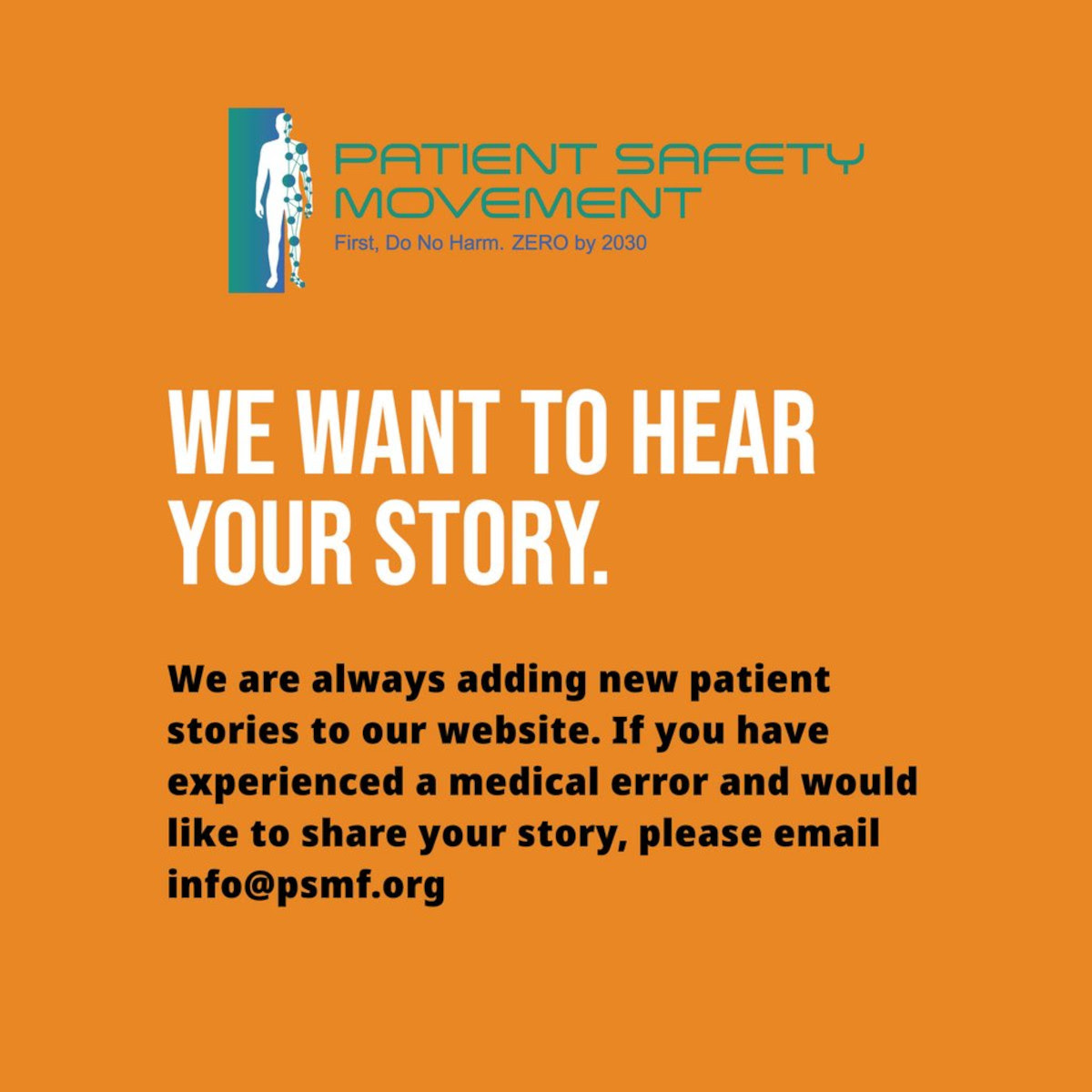
DONOR TESTIMONIALS — WHY I GIVE
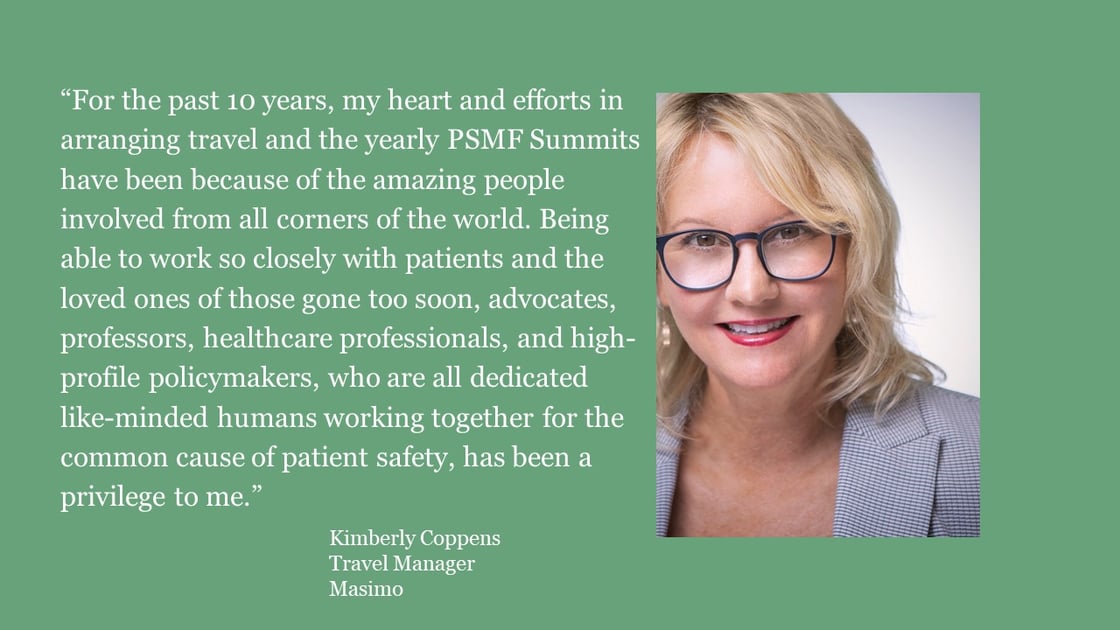
GOVERNANCE BOARD
Joe Kiani, MS, Founder and Immediate Past Chairman of PSMF, Founder, Chairman & CEO of Masimo
Mike Durkin, OBE, MBBS, FRCA, FRCP, DSC, Chairman of PSMF, Senior advisor on Patient Safety Policy and Leadership, Institute of Global Health Innovation, Imperial College London
Michael A.E. Ramsay, MD, FRCA, Chief Executive Officer, PSMF
Sarah Kiani, Director, Masimo Foundation for Ethics, Innovation, and Competition
Abbasseh Towfigh, MPD, Executive Director and Secretary, Ayeneh Foundation
Steven J. Barker, PhD, MD, Chief Science Officer, Masimo Corporation, Professor Emeritus of Anesthesiology, University of Arizona Health Sciences
Jannicke Mellin-Olsen, MD, DPH, Past President, World Federation of Societies of Anesthesiologists
Philip D. Lumb, MB, BS, MD, MCCM, FCCP, Professor of Anesthesiology, Keck School of Medicine, University of Southern California
Najmedin Meshkati, PhD, MS, Professor of Civil/Environmental Engineering, University of Southern California
Javier T. Davila, MD, Ambassador, PSMF in Mexico, Former Medical Director, Mexican Social Security Institute, Head of Medical Education, Research and Health Public Policy
Robin Betts, RN, CPHQ, MBA-HA, Vice Chair, PSMF, Vice President, Safety Quality & Regulatory Services, Kaiser Foundation Hospitals and Health Plan, Kaiser Permanente Northern California
Nasim Afsar, MD, MBA, MHM, Chief Health Officer at Oracle Health
Edward Kelley, PhD, Chief Global Health Officer, ApiJect Systems
David B. Mayer, MD, Executive Director, MedStar Institute for Quality and Safety
Omar Ishrak, PhD, Executive Chairman and Chairman of the Board of Directors, Medtronic, Chairman of the Board of Directors, Intel
Charlie Miceli, CPM, Treasurer, PSMF, Chief Supply Chain Officer, Network VP of University of Vermont Health Network
Vonda Vaden Bates, Patient Advocate, CEO, 10th Dot
Alicia Cole, Patient Safety Consultant
Jim Messina, BA, CEO, The Messina Group
OUR STORY
 In 2012, Joe Kiani founded the nonprofit Patient Safety Movement Foundation (PSMF) to eliminate preventable medical errors in hospitals. His team worked with patient safety experts from around the world to create Actionable Evidence-Based Practices (AEBP) that address the top challenges. The AEBP is available without charge to hospitals online.
In 2012, Joe Kiani founded the nonprofit Patient Safety Movement Foundation (PSMF) to eliminate preventable medical errors in hospitals. His team worked with patient safety experts from around the world to create Actionable Evidence-Based Practices (AEBP) that address the top challenges. The AEBP is available without charge to hospitals online.
Hospitals are encouraged to make a formal commitment to ZERO preventable deaths, and healthcare technology companies are asked to sign the Open Data Pledge to share their data so that predictive algorithms that can identify errors before they become fatal can be developed. The Foundation’s annual World Patient Safety, Science & Technology Summit brings together all stakeholders, including patients, healthcare providers, medical technology companies, government employers, and private payers. The PSMF was established through the support of the Masimo Foundation for Ethics, Innovation, and Competition in Healthcare. For more information, please visit psmf.org.

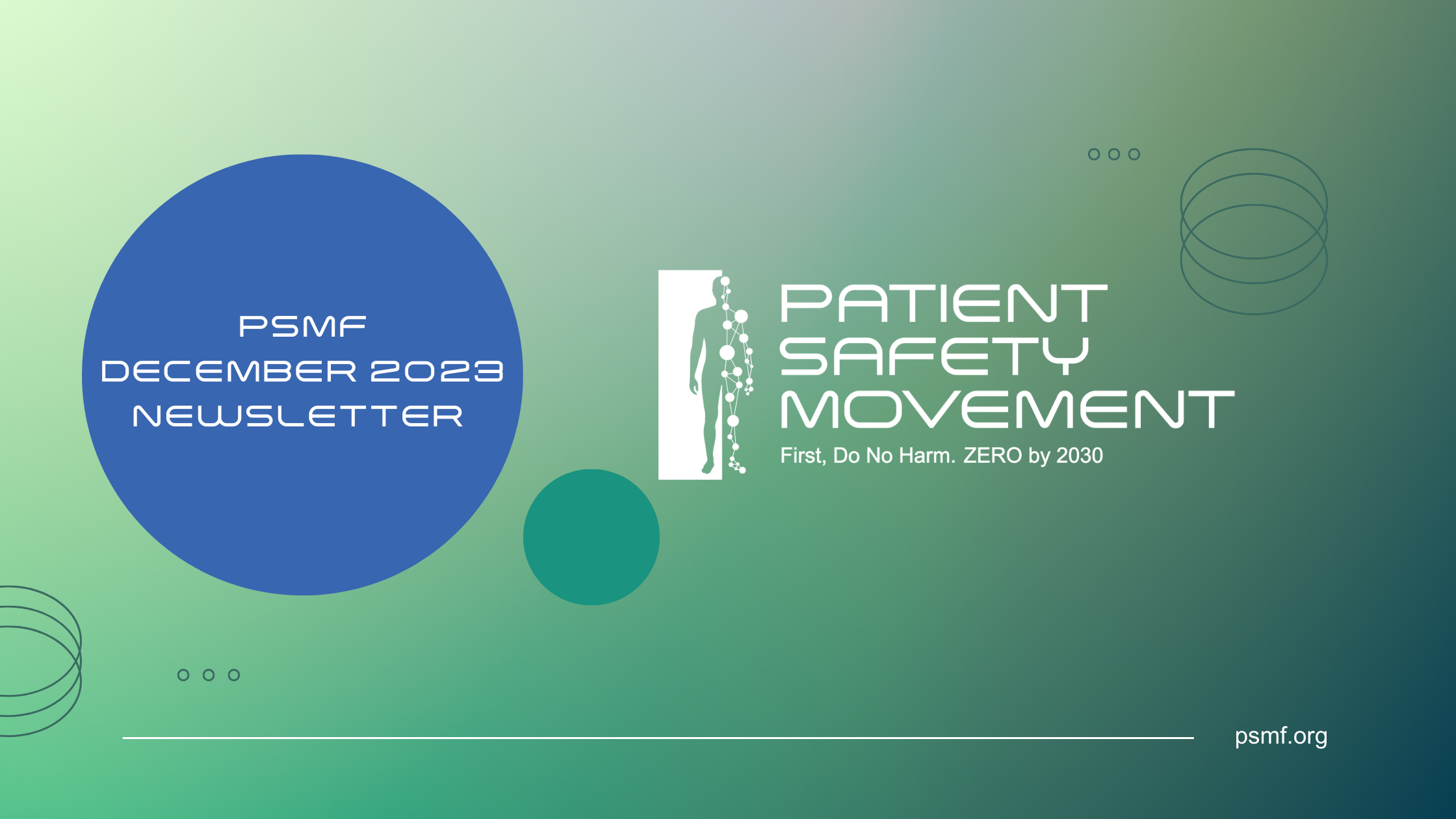
.gif?width=1200&upscale=true&name=Green%20Minimalist%20Professional%20Business%20Blog%20Banner%20(2).gif)
